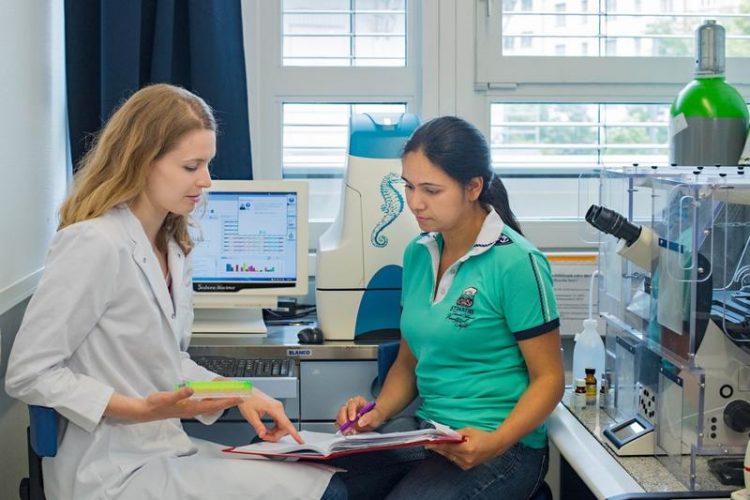Novel mechanisms of action discovered for the skin cancer medication Imiquimod

Dr. Christina J. Groß (links) and Dr. Ritu Mishra. Andreas Heddergott / TUM
The fact that a given medication has been approved for use doesn't automatically mean that all of its mechanisms of action have been completely investigated and understood. New findings and technical possibilities continuously enable more precise insights into the processes that take place within the human body. As a result, we constantly gain a better understanding of how known medicines work and what approaches could be practical for new medications.
PD Dr. Olaf Groß, group leader at the TUM Institute for Clinical Chemistry and Pathobiochemistry , has been working together with his team to investigate Imiquimod. This medication has been successfully used to treat viral skin infections and certain types of skin cancer since 1997. The scientists have now published their results in the journal “Immunity”.
Imiquimod is an immunomodulatory agent, which means it triggers an immune reaction which causes the body's immune system to attack modified cells. For several years, this process was the medication's only known mechanism of action. However, in the meantime it has been shown that imiquimod also triggers other processes in the body. On one hand, imiquimod directly impairs the growth of cancer cells.
On the other hand, Imiquimod activates a complex within cells of the immune system termed the inflammasome. While the inflammasome is very important for our body’s ability to defend against infection, uncontrolled activation of the inflammasome can lead to inflammatory diseases. “We think that these other mechanisms of action of Imiquimod might contribute to the efficacy or adverse side effects of the medication,” says Olaf Groß.
Intervention in the mitochondria
Imiquimod specifically activates the NLRP3 inflammasome, which is a special type of inflammasome that responds to tissue stress and cellular damage. Olaf Groß and his team were able to show that NLRP3 is activated because Imiquimod impairs the respiratory chain in mitochondria. The respiratory chain is a series of mitochondrial protein complexes that generates the energy, in the form of a molecule called adenosine triphosphate, or ATP for short, that cells need to survive.
“Inhibition of the respiratory chain by imiquimod not only impairs ATP production, but also results in the production of toxic oxygen radicals,” explains Dr. Ritu Mishra, one of the two primary authors of the study. “Imiquimod causes an especially large amount of radicals to be released. In contrast to other substances that intervene in the respiratory chain but generate a lower amount of radicals, here a threshold value is exceeded that results in the activation of NLRP3.”
Implications for anti-inflammatory medications
“There is a lot of excitement about generating new anti-inflammatory medications by targeting the NLRP3 inflammasome,” says Dr. Christina J. Groß, also one of the study's primary authors. “We hope that our research will lead to the design of medications that can prevent dangerous hyperactivation of the NLRP3 inflammasome that may occur in diseases like gout and multiple sclerosis.” Olaf Groß and his team are following-up on this study by investigating whether the effect of imiquimod on the mitochondria is the mechanism behind the unexplained finding that imiquimod directly inhibits growth of cancer cells. After that, they plan to investigate new chemical substances related to Imiquimod in order to find out how the various effects of the medication can be uncoupled.
Publication
C.J. Groß, R. Mishra, K.S. Schneider, G. Médard, J. Wettmarshausen, D.C. Dittlein, H. Shi, O. Gorka, P.-A. Koenig, S. Fromm, G. Magnani, T. Ćiković, L. Hartjes, J. Smollich, A.A.B. Robertson, M.A. Cooper, M. Schmidt-Supprian, M. Schuster, K. Schroder, P. Broz, C. Traidl-Hoffmann, B. Beutler, B. Kuster, J. Ruland, S. Schneider, F. Perocchi, O. Groß. “K+ Efflux-Independent NLRP3 Inflammasome Activation by Small Molecules Targeting Mitochondria”. Immunity (2016). DOI: http://dx.doi.org/10.1016/j.immuni.2016.08.010
High-Resolution images
Contact
PD Dr. rer. nat. Olaf Groß
Institute for Clinical Chemistry and Pathobiochemistry
Klinikum rechts der Isar
Technical University of Munich
+49 89 4140-4874
olaf.gross@tum.de
Media Contact
All latest news from the category: Life Sciences and Chemistry
Articles and reports from the Life Sciences and chemistry area deal with applied and basic research into modern biology, chemistry and human medicine.
Valuable information can be found on a range of life sciences fields including bacteriology, biochemistry, bionics, bioinformatics, biophysics, biotechnology, genetics, geobotany, human biology, marine biology, microbiology, molecular biology, cellular biology, zoology, bioinorganic chemistry, microchemistry and environmental chemistry.
Newest articles

An Endless Loop: How Some Bacteria Evolve Along With the Seasons
The longest natural metagenome time series ever collected, with microbes, reveals a startling evolutionary pattern on repeat. A Microbial “Groundhog Year” in Lake Mendota Like Bill Murray in the movie…

Witness Groundbreaking Research on Achilles Tendon Recovery
Achilles tendon injuries are common but challenging to monitor during recovery due to the limitations of current imaging techniques. Researchers, led by Associate Professor Zeng Nan from the International Graduate…

Why Prevention Is Better Than Cure—A Novel Approach to Infectious Disease Outbreaks
Researchers have come up with a new way to identify more infectious variants of viruses or bacteria that start spreading in humans – including those causing flu, COVID, whooping cough…



